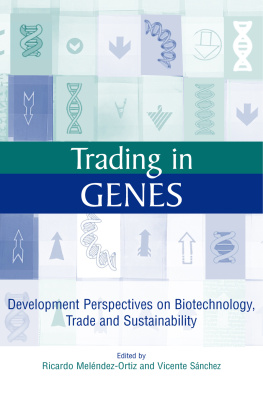
Biotechnology and the Politics of Plants
Biotechnology and the Politics of Plants explores the mysterious phenomenon of apomixis, the ability of certain plants to self-clone, and its potential as a revolutionary tool for agriculture and enhancing food security, that may soon be a reality. Through historical anthropological and ethnographic study, Matt Hodges traces the development of the CIMMYT Apomixis Project, a prominent frontier research programme, and its reinvention as a leading public-private partnership (PPP). He analyzes the fast-moving historical transition from public sector, mixed plant breeding approaches grounded in genetics, to a contemporary era of agricultural biotechnology and genomics where PPPs are a leading format. In doing so, he explores how social contexts of research shape how knowledge is produced, as well as what remains unknown, and constrain the development of an Apomixis Technology. The book presents an inventive approach informed by the anthropology of time, science and technology studies, and dialogues with the work of Gilles Deleuze, Paul Rabinow, Hannah Arendt, Andrew Pickering and Eduardo Viveiros de Castro. Hodges outlines novel ways of integrating notions of history and becoming, and considers how apomixis offers up an alternative image of thought to theoretical concepts such as the well-known rhizome. Biotechnology and the Politics of Plants makes a valuable contribution to both the growing social scientific literature on genomics and biotechnology, and recent anthropological debates on time and history.
Matt Hodges is a social and historical anthropologist based at the School of Anthropology and Conservation at the University of Kent, UK. He works on the anthropology of science and technology, and themes of history, time and the experience of cultural transformation and rupture in rural Europe. This focus extends to the technologies and infrastructures that drive such upheavals, including agricultural biotechnology. Recent work on French radical historiography appeared in Current Anthropology 60(3).
Routledge Focus on Anthropology
The Primate Zoonoses
Culture Change and Emerging Diseases
Loretta A. Cormier and Pauline E. Jolly
Aerial Imagination in Cuba
Stories from Above the Rooftops
Alexandrine Boudreault-Fournier
Biotechnology and the Politics of Plants
Disciplining Time
Matt Hodges
For more information about this series, please visit: www.routledge.com/anthropology/series/RFA
Biotechnology and the Politics of Plants
Disciplining Time
Matt Hodges
First published 2021
by Routledge
2 Park Square, Milton Park, Abingdon, Oxon OX14 4RN
and by Routledge
605 Third Avenue, New York, NY 10158
Routledge is an imprint of the Taylor & Francis Group, an informa business
2021 Matt Hodges
The right of Matt Hodges to be identified as author of this work has been asserted by him in accordance with sections 77 and 78 of the Copyright, Designs and Patents Act 1988.
All rights reserved. No part of this book may be reprinted or reproduced or utilised in any form or by any electronic, mechanical, or other means, now known or hereafter invented, including photocopying and recording, or in any information storage or retrieval system, without permission in writing from the publishers.
Trademark notice: Product or corporate names may be trademarks or registered trademarks, and are used only for identification and explanation without intent to infringe.
ISBN: 978-1-138-31452-8 (hbk)
ISBN: 978-0-367-20146-3 (pbk)
ISBN: 978-1-003-18309-9 (ebk)
Typeset in Times New Roman
by Newgen Publishing UK
For Loreawith love.
Contents
A book of this kind emerges from a nexus of relationswhich I now gratefully acknowledge. My sincere thanks to the CGIAR Secretariat for their invitation to participate in the CGIAR Alliance Deputy Executive and Private Sector Committee Workshop on Public-Private Partnerships, at which I presented key arguments and conclusions of this research. An outline of the principal findings of part 3 was first published on the CGIAR website as electronic output from the workshop, as were the visuals. I would also like to thank CIMMYT for the kind invitation to deliver an anthropological study of the projects in this book for that event, and vital support in providing access to ethnographic information. CIMMYT also kindly facilitated the use of its library in Mexico, and this openness reflects that institutions commitment to provision of international public goods. I am also grateful to Steve Hughes and Andrew Pickering from my time at the University of Exeter, whose support for this work was greatly appreciated. Steve Hughes, as a co-signatory of the Bellagio Apomixis Declaration, was a firm believer in the potential of apomixis for agriculture. Andrew Pickerings guidance was indispensable, as was the warm welcome he offered into the field of Science and Technology Studies. I was also fortunate to interview selected participants and stakeholders in these projects and, where relevant, from the wider field of apomixis research. Invariably, the welcome I received was open and friendly, even if there were sometimes limits to the information that could be shared. I do not name these individuals here, but I thank them for sharing their extensive knowledge, opinions and insights into the subject matter of this book, and for their encouragement.
Turning elsewhere, some of this research was presented as part of the Economic and Social Research Council (ESRC) Seminar Series, Conflicts in Time: Rethinking Contemporary Globalisation, convened by Laura Bear and Stephan Feuchtwang. I would like to thank Laura and Stephan for their kind invitation, and for their encouragement and constructive feedback on the work I presented over the course of that series of meetings. My warm thanks to Glenn Bowman and Elizabeth Cowie for their friendship, advice and for their hospitality, which was always invaluable. Charles Stewart is a source of ongoing support and inspiration for my work on time and history, and my thanks and appreciation to him, and to Stephan Palmi and Eric Hirsch, who have encouraged my work on the anthropology of history. Charlie and Patricia Bonallack offered hospitality and good company at their home in Montpellier during my research in France. At the University of Kent, I am fortunate to have colleaguesAnna Waldstein, Dimitrios Theodossopoulos, Ozlem Biner, and Raj Puriwhose research is an inspiration. Conversations with my PhD students Jade Richards, Oscar Krger, and Chris de Coulon Berthoud were illuminating. Tracy Kivell helped make time for me to complete this book across a dark summer, which I greatly appreciate, and my warm thanks also to Alexandra Leduc-Pagel for her enthusiasm and support for this project. And I am grateful to Judith Bovensiepen, for her many kindnesses and encouragement during the writing of this book, and for sharing her anthropological acumen when I needed it most. Of course, no one named above is responsible for the content of the narrative that follows. At home in Canterbury, I would like to thank Susana Gozalo Martnez for her warm support, and many other things without which this project could not have been completed. Finally, Niko Hodges and Lorea Hodges deserve a special thank you, as they waited patiently for this book to be completed over a long lockdown, and still found plenty to smile about in the sunshine.










